Please use this identifier to cite or link to this item:
https://hdl.handle.net/10316.2/39536| DC Field | Value | Language |
|---|---|---|
| dc.contributor.author | Carasa, Pedro | - |
| dc.date.accessioned | 2016-09-21T10:32:01Z | |
| dc.date.accessioned | 2020-09-29T20:22:42Z | - |
| dc.date.available | 2016-09-21T10:32:01Z | |
| dc.date.available | 2020-09-29T20:22:42Z | - |
| dc.date.issued | 2010 | - |
| dc.identifier.issn | 1645-2259 | - |
| dc.identifier.issn | 2183-8615 (digital) | - |
| dc.identifier.uri | https://hdl.handle.net/10316.2/39536 | - |
| dc.description.abstract | No contexto das quatro etapas da historiografia espanhola sobre pobreza e assistência, analisam-se os objectivos que nortearam cada geração de historiadores. Estes estiveram sempre vinculados aos sistemas gerais de cada momento histórico e dependentes da ideologia de cada período historiográfico, desde o providencialismo, até ao pós-modernismo, passando pelo liberalismo e o materialismo histórico. As suas limitações mais gritantes foram impostas pela racionalidade clássica-patriarcal aplicada à economia e à sociedade, por se centrar nos sistemas e não nas pessoas, por se esgotar no método dialéctico e por se apoiar nos sujeitos abstractos, colectivos e institucionais dos privilegiados, a Coroa, o Estado ou a classe social. O resultado foi o fraco protagonismo do sujeito consciente e a desumanização da história social. | por |
| dc.description.abstract | In the context of the four stages of Spanish historiography on poverty and aid, this paper analyses the purposes which have driven every generation of historians. These are the underlying purposes of the global systems of every historical moment, which depend on the ideology of each stage of historiography, from providentialism to post-modernism, including liberalism and historical materialism. Its strongest constraints were imposed by the classical and patriarchal reasoning applied to the economy and society, as it is system and not people-oriented, it is restricted to the dialectic method, and focuses on abstract, collective and institutional subjects of the favoured, the Crown, the State or social class. The final effect was the weak presence of the cognisant individual and the dehumanization of social history. | eng |
| dc.language.iso | spa | - |
| dc.publisher | Centro de História da Sociedade e da Cultura | - |
| dc.rights | open access | - |
| dc.subject | Historiography | eng |
| dc.subject | Poverty and aid | eng |
| dc.subject | Materialism | eng |
| dc.subject | Cultural history | eng |
| dc.subject | Historiografia | por |
| dc.subject | Pobreza e assistência | por |
| dc.subject | Materialismo | por |
| dc.subject | História cultural | por |
| dc.title | Límites de la historia social clásica de la pobreza y la asistencia en España | por |
| dc.type | article | - |
| uc.publication.collection | Revista de História da Sociedade e da Cultura vol. 10, nº 2 | - |
| uc.publication.firstPage | 569 | - |
| uc.publication.issue | 2 | - |
| uc.publication.lastPage | 591 | - |
| uc.publication.location | Coimbra | - |
| uc.publication.journalTitle | Revista de História da Sociedade e da Cultura | - |
| uc.publication.volume | 10 | por |
| dc.identifier.doi | 10.14195/1645-2259_10-2_10 | - |
| uc.publication.section | Artigos | - |
| uc.publication.orderno | 10 | - |
| uc.publication.area | Artes e Humanidades | - |
| uc.publication.manifest | https://dl.uc.pt/json/iiif/10316.2/39536/246153/manifest?manifest=/json/iiif/10316.2/39536/246153/manifest | - |
| uc.publication.thumbnail | https://dl.uc.pt/retrieve/11823730 | - |
| item.grantfulltext | open | - |
| item.fulltext | With Fulltext | - |
| Appears in Collections: | Revista de História da Sociedade e da Cultura | |
Files in This Item:
| File | Description | Size | Format | |
|---|---|---|---|---|
| limites_de_la_historia_social_clasica.pdf | 691.44 kB | Adobe PDF |  |
Items in DSpace are protected by copyright, with all rights reserved, unless otherwise indicated.
